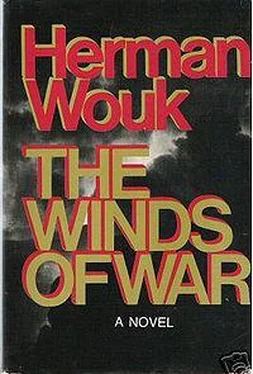Herman Wouk - The Winds of War
Здесь есть возможность читать онлайн «Herman Wouk - The Winds of War» весь текст электронной книги совершенно бесплатно (целиком полную версию без сокращений). В некоторых случаях можно слушать аудио, скачать через торрент в формате fb2 и присутствует краткое содержание. Год выпуска: 1971, Издательство: Collins, Жанр: Историческая проза, на английском языке. Описание произведения, (предисловие) а так же отзывы посетителей доступны на портале библиотеки ЛибКат.
- Название:The Winds of War
- Автор:
- Издательство:Collins
- Жанр:
- Год:1971
- ISBN:нет данных
- Рейтинг книги:4 / 5. Голосов: 1
-
Избранное:Добавить в избранное
- Отзывы:
-
Ваша оценка:
- 80
- 1
- 2
- 3
- 4
- 5
The Winds of War: краткое содержание, описание и аннотация
Предлагаем к чтению аннотацию, описание, краткое содержание или предисловие (зависит от того, что написал сам автор книги «The Winds of War»). Если вы не нашли необходимую информацию о книге — напишите в комментариях, мы постараемся отыскать её.
About the Author
Herman Wouk's acclaimed novels include the Pulitzer-Prize winning
;
;
;
;
;
; and
.
The Winds of War — читать онлайн бесплатно полную книгу (весь текст) целиком
Ниже представлен текст книги, разбитый по страницам. Система сохранения места последней прочитанной страницы, позволяет с удобством читать онлайн бесплатно книгу «The Winds of War», без необходимости каждый раз заново искать на чём Вы остановились. Поставьте закладку, и сможете в любой момент перейти на страницу, на которой закончили чтение.
Интервал:
Закладка:
Meanwhile Rhoda adapted merrily to diplomatic life. As she got used to her staff and to Berlin customs, her dinner parties increased in size. She invited the Grobkes to a big one that included the chargé d’affaires, a French film actress, the conductor of the Berlin Philharmonic Orchestra, and a dour, stout German general named Armin von Roon, with a particularly hooked nose and an exceedingly stiff carriage. Rhoda knew none of these people well. General von Roon, for instance, she had met at Colonel Forrest’s house; and because someone had told her that he stood high in the Wehrmacht and was considered brilliant, she had made up to him. She had a gift for charming in a momentary encounter. She always looked elegant, she could be amusing or sexy without forcing either note, and she made one feel that it would be pleasant to know her better. People tended to accept her invitations.
The company was above the level of Grobke and his wife. They were dazzled and flattered, and the presence of Room all but froze them with awe. Grobke whispered to Victor Henry at one point that Roon was the real brain in Supreme Headquarters. So Pug tried to talk to Roon about the war, and found that he spoke astonishing good English. But he would utter only frosty generalities, which made the attaché think the better of him, though it yielded nothing to report.
Before the evening was out Grobke, full of wine and brandy, took Victor Henry aside and told him that the captain of the Swinemünde navy yard was making stupid difficulties, but that he was going to push the visit through, “and I’ll get your English friend in too. God damn it. I said I would and I will. These shore-based bastards just live to create trouble.”
The Henrys received one cheerless letter from Madeline, written when she arrived in Newport for the summer. Warren, as usual, did not write at all. Early in July the letter Byron had written his father at last caught up with him:
Dear Dad:
I received your letter and it threw me. I guess I gave you the wrong impression about this girl Natalie Jastrow. It’s fun to work with her, but she’s older than I am, and she was a junior Phi Bete at Radcliffe. Her best boyfriend is a Rhodes Scholar. I’m not in that league. However, I appreciate your good advice. She is really excellent company, and talking to her improves my mind. That should please you.
Dr. Jastrow has me researching the Emperor Constantine’s military campaigns. I took the job for the money, but I’m enjoying it. That whole period, when the world balance tips from paganism to Christianity, is really worth knowing, Dad. It has some parallels to our own day. I think you’ll like Dr. Jastrow’s new book. He’s just a scholar and wouldn’t know a torpedo boat from a medium tank, yet he has a way of grasping an ancient campaign and describing it to anybody can understand it and sort of picture what those times were like.
Siena’s going to be overrun with tourists for the Palio, a goofy horse race they put on every year. The nags run around the town square, and they say all hell usually breaks loose. Warren will make a great flier. Well, I guess that’s about it. Love to all,
ByronChapter 5
Since the fourteenth century — so Byron had learned — nothing much had happened in Siena besides the Palios. A rich city-state of the Middle Ages, the military rival of Florence, Siena in 1348 had been isolated by the Black Death, and frozen in its present form as by a spell. A few art lovers now drifted here to admire the fourteenth-century paintings and architecture. The world at large flocked to Siena twice a year to watch the mad horse races, and otherwise let the bypassed town, a living scene out of an old tapestry, molder in the Tuscan sunshine.
In nine years of living just outside Siena, Aaron Jastrow had never attended a Palio. When Byron asked why, Jastrow held forth on the cruel public games of Roman the forerunners of all these burlesque races of the Middle Ages. The Palio had happened to survive in mountain-locked Siena, he said, like a dinosaur in the Lost World. “Some medieval towns raced donkeys or buffaloes,” he said. “In papal Rome, they raced Jews. I’m not exactly afraid I’ll be pressed into service if a horse should break its leg. I’m just not very interested.” Moreover, his friend the archbishop had told him long ago that elderly people avoided the Palio, because of the risk of being trampled.
But now there was the article to write. Jastrow obtained tickets for both runnings, and sent Byron and Natalie to research in the town while he read books on the subject.
They first learned that the race was a contest among Siena’s neighborhoods or parishes. Each district, called a contrada , comprised a few square blocks of old houses. All of Siena contained but two and a half square miles and some thirty thousand people. But these little wards — there were seventeen, and ten competed each year — took their boundaries, their loyalties, their colors, their emblems, with inconceivable seriousness. They bore curious names like Oca, Bruco, Torre, Tartuca, Nicchio (Goose, Caterpillar, Tower, Tortoise, Seashell). Each ward had its flag, its anthems, its separate churches, and even a sort of capital hall.
Byron and Natalie spent days walking through the angular streets. When an occasional old omnibus snorted by, they had to flatten against the high red-brown walls for their lives; there were no sidewalks, and the somnolent, deserted streets were hardly wider than the bus. Maps in hand, the pair visited the tiny districts one by one, trying to pin down the background of the Palio. They found out about alliances and hatreds going back hundreds of years. Panther was friendly to Giraffe, Tortoise loathed Snail, and so forth, in a tangle of emotions, very real and current.
They came to realize too that the famous race itself was just a crooked farce, and that everybody knew it. The contrade owned no horses. A few days before each race, animals from the nearby countryside were brought into town, and the competing districts drew lots for them. The same stolid durable nags came back year after year, shuffling from one neighborhood to another by the luck of the draw.
What then made a race of it? Bribing the jockeys, doping the animals, conspiring to block the best horses or injure their riders: only such devices turned the Palio into a murky contest of a sort. The largest, richest neighborhoods therefore tended to win; but the outcome was unpredictable, because a poor, small district might put on a desperate surge. It might squander funds in bribes, pledge future alliances, swear to future treacheries, just to win a banner to bear off to its hall. For that was what the “Palio” itself was: a banner painted with a picture of the Virgin. Like all medieval races, this one was run on sacred days; it was a manifestazione in honor of the Virgin. Hence her portrait graced the prize, and faded Palios by the dozens hung in the contrada halls.
After a while, even Jastrow became interested too, in an ironic way. The crookedness, he said, was obviously the soul of the thing; old European skulduggery, bribes and counterbribes, doublecross and triplecross, sudden reversals of old alliances, secret temporary patching up of ancient enmities, convoluted chicanery in the dark — all leading at last to the horse race, when all the shadowy corruption was put to explosive proof in red sunset light.
“Why, this article will write itself,” he said cheerfully one day at lunch. “These Sienese have evolved willy-nilly a grotesque little parody of European nationalism. The archbishop told me that a woman from the Panther neighborhood who marries a Caterpillar or a Tower man will go back to have her babies in a house on a Panther street to make sure they’ll be Panthers. Patriotism! And of course, the insane explosion every summer is the key. All this obsolete mummery — Snails, Giraffes, what have you — would have died out centuries ago, except for the lovely colorful outbursts of excitement, treachery, and violence in the races. The Palio is war.”
Читать дальшеИнтервал:
Закладка:
Похожие книги на «The Winds of War»
Представляем Вашему вниманию похожие книги на «The Winds of War» списком для выбора. Мы отобрали схожую по названию и смыслу литературу в надежде предоставить читателям больше вариантов отыскать новые, интересные, ещё непрочитанные произведения.
Обсуждение, отзывы о книге «The Winds of War» и просто собственные мнения читателей. Оставьте ваши комментарии, напишите, что Вы думаете о произведении, его смысле или главных героях. Укажите что конкретно понравилось, а что нет, и почему Вы так считаете.












